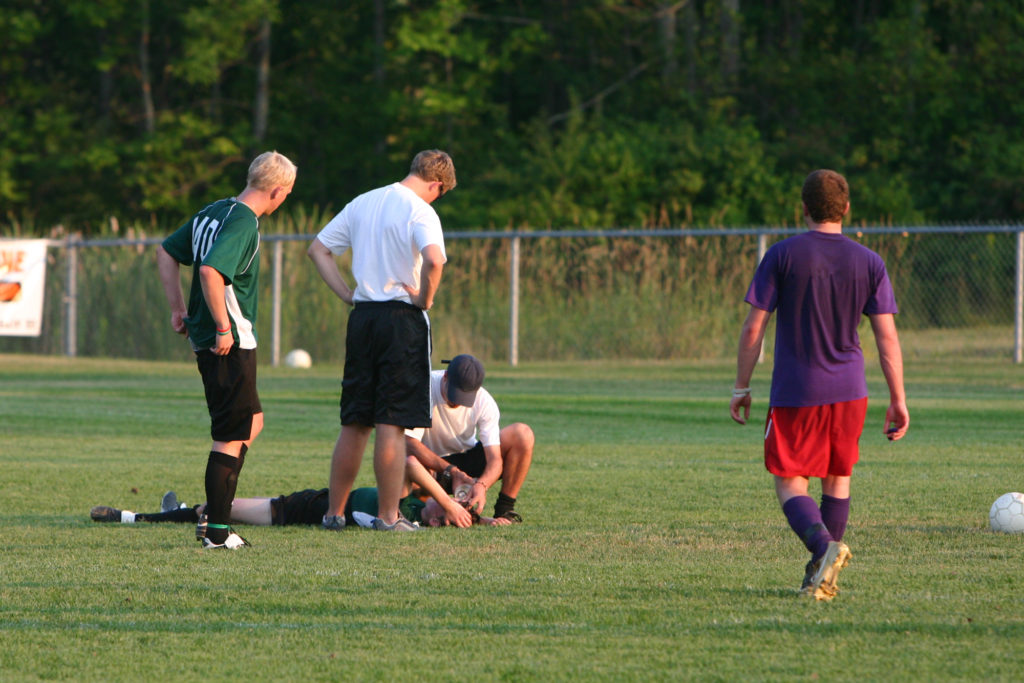
Do you know which contact sports cause the most concussions? If you said football, you are doubly correct. Both football and what we Americans refer to as soccer are at the top of the list for sports-related brain injury to both adult athletes and children.
We all know what can happen when two players collide on the field. The force of contact to their heads causes their brains to “bounce” within their skulls. Similarly, every time a soccer ball bounces off a player’s head, it has a cumulative traumatic effect. Concussions also occur from falls and impact to the head on and off the field.
The scary thing is that although a concussion can change the way a brain functions, it doesn’t necessarily change its structure, which means a brain can look normal on an MRI or CT scan after a concussion.
Nevertheless, there are many ways to tell if you or your child has sustained a sports-related concussion. Concussion symptoms can include, but not limited to, any of the following:
- Headache or pressure in the head
- A ringing sound in the ears
- Dizziness or balance problems
- Double or blurred vision
- Nausea or vomiting
- Confusion or difficulty concentrating
- Memory problems
- Appearing dazed or stunned
- Delayed response
- Sensitivity to light or noise
If you suspect that you or your child has sustained a concussion, seek immediate medical attention. A thorough examination and monitoring is crucial – particularly within the first 24 hours of injury.
In terms of preventing concussions, there are certain precautions young athletes and their parents should take:
- Wear a helmet – This will not always prevent a concussion, but it can significantly reduce the risk of a skull injury. Just make sure the helmet is in good condition and fits properly.
- Have your child undergo pre-participation testing – Young athletes should undergo baseline testing focusing on their ability to concentrate, reaction time, and memory before signing up for contact sports. This way, if a concussion is suspected during play, the same test can check for any changes or disturbances in the levels previously recorded.
- Limit contact during practices – Coaches should increase supervision and limit heavy contact – such as head-on blocking and full-speed drills – during practice to help reduce the risk of head
- Teach techniques for safe play – For example, football players should be advised to avoid hits to the head during tackles, and the practice should be prohibited for players 10 years of age or younger.
- Supervise your child’s recovery – If your child sustains a concussion, it is important to follow his or her doctor’s orders. That means getting enough rest, avoiding screens and video games until the symptoms have subsided, and staying on the team’s disabled list until fully recovered. Otherwise, your child will be more likely to suffer another concussion from an even less traumatic hit.
Brain Injury Specialists in Delaware
Dr. Anne Mack is one of the only doctors in Delaware who is a certified Brain Injury Specialist, and we are proud to have her here on our team at Delaware Back Pain & Sports Rehabilitation Centers. She can facilitate care and be the primary point of contact between different physicians such as your neurologist, neurosurgeon, and primary care physician. She can help you work through your concussion or other traumatic brain injury so you can achieve a full recovery.
If you are looking for a dependable and experienced medical team to help with your pain management or sports injury recovery, the experts at Delaware Back Pain & Sports Rehabilitation Centers would love to help. You will get an individualized medical rehabilitation program that is personalized to your needs so that you can get better quickly and return to the activities you love.
Just fill out our online appointment request form today, or call your nearest Delaware Back Pain & Sports Rehabilitation Centers location to schedule a consultation with one of our caring, skilled doctors. We have seven convenient locations across Delaware to serve our patients, and we look forward to helping you get well.


